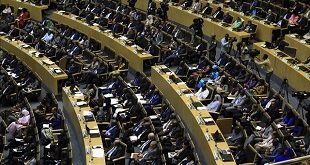
By Rosebell Kagumire
The current parliamentary scorecard, published by the African Leadership Institute (AFLI), reveals women legislators have performed worse than their male counterparts, especially in the second session of the 8th parliament. Women occupy 101 out of 333 seats in parliament, but only 16 are directly elected MPs with constituencies. The rest are beneficiaries of affirmative action, which began for women legislators in 1989 and was incorporated in the 1995 constitution, together with representation of people with disabilities (PWD), youth, and workers.
According to the scorecard, women performed slightly better than men in attendance, but men took the lead in participating and influencing debate, and in accessibility to their constituents. Although generally women performed worse than men, individual women lawmakers score highly, with the top performer in plenary being Florence Adong, MP for Labwor County in Abim District. One of the top constituency performers was the late Viccy Kyohuhairwa, former Woman MP of Insingiro.
But many women MPs have refuted the poor ratings, calling the scorecard “gender blindâ€. Soroti Woman MP Alice Alaso told The Independent that the criterion for rating was insensitive to women. “The dynamics of the parliament institution are tough for many women. We have had microphones where everyone would shout to get the attention of the speaker and that is not so feminine,†she said. “Women are doing a good job and if the institution was more gender friendly, then these women would do much better.â€

Dr Josephine Ahikire of the Department of Women and Gender Studies at Makerere University describes the scorecard as “male-centredâ€. “Parliament is all about politics of catching the speaker’s eye and the scorecard doesn’t put into account the quality of the contribution and whether the MPs are being knowledgeable on what is being discussed,†she said.
The poor performance of women in parliament has left questions regarding whether female affirmative action is serving the purpose for which it was introduced – to reduce inequality and marginalisation of women. Dr. Slyvia Tamale of Makerere law school, in her article The Implementation of Quotas: African Experiences, argues that although the introduction of quotas signified the end of women’s exclusion from decision-making bodies, it has not resulted in real access to power for women in Uganda. “The law was a largely symbolic top-down imposition by the state to include marginalized groups. This provides for largely descriptive representation of women, rather than substantive representation, whereby women are connected to, and articulate the interests of, a constituency.â€
Aramanzan Madanda, a lecturer in Gender Studies at Makerere University, said a high turnover of women MPs has given the long-serving male MPs a chance to excel. “The high turnover of women MPs at every election makes parliament lose experienced debaters for those with least experience,†“Sometimes competition for ministerial appointments makes some men to support less experienced women against senior ones so they can have a better chance of being appointed.â€
Some analysts argue that women MPs in the 8th Parliament are doing little to deal with issues affecting ordinary women because they have been engulfed in party politics. Dr. Ahikire agrees. “This is true, especially with women in NRM. They would have made a big difference because they belong to the party in power but they have joined politics and its survival for the fittest.â€
Mbarara MP Emma Boona, however, disagrees. “Women legislators have been on top of the issues that affect women to ensure that justice is done.†Nevertheless, it is difficult to articulate the gains of affirmative action in improving lives of women or even having more women wielding power in the country. Availing women positions in parliament has not been matched by improving lives of women in rural Uganda with regard to domestic violence, disinheritance, and related issues.
Part of the reason for this may be the lack of clarity regarding the role of women MPs. According to a review on affirmative action, “This lack of clarity about mandate, role and constituency makes the policy of affirmative action susceptible to abuse, clientelism and political manipulation.â€
Women representation by affirmative action is often perceived as gift from the NRM government rather than a right. Against this background, many women in the NRM cannot avoid the pulls and pushes of party politics when they should be concentrating on improving women’s lives. “It is not surprising that a large number of women beneficiaries of affirmative action, not only feel obliged to the NRM government, but also dare not challenge the status quo thereby defeating the intended purpose of affirmative action in the constitution.â€
But supporters of affirmative action say it is the single means of entry into politics and decision-making, and has resulted in the most significant increase in the number of women representatives. There has been a significant increment in the number of women in the national legislature, from 18 percent during the NRC to the current 31 percent. Because of this, some argue there is now greater interest from women to participate in public affairs than in the 1980s.
And while the scorecard shows that women performed poorly in the legislature, there is no doubt the increased visibility and effectiveness of women in politics have challenged widespread patriarchal beliefs and practices, thus making the future brighter for many women in the country.
 The Independent Uganda: You get the Truth we Pay the Price
The Independent Uganda: You get the Truth we Pay the Price


